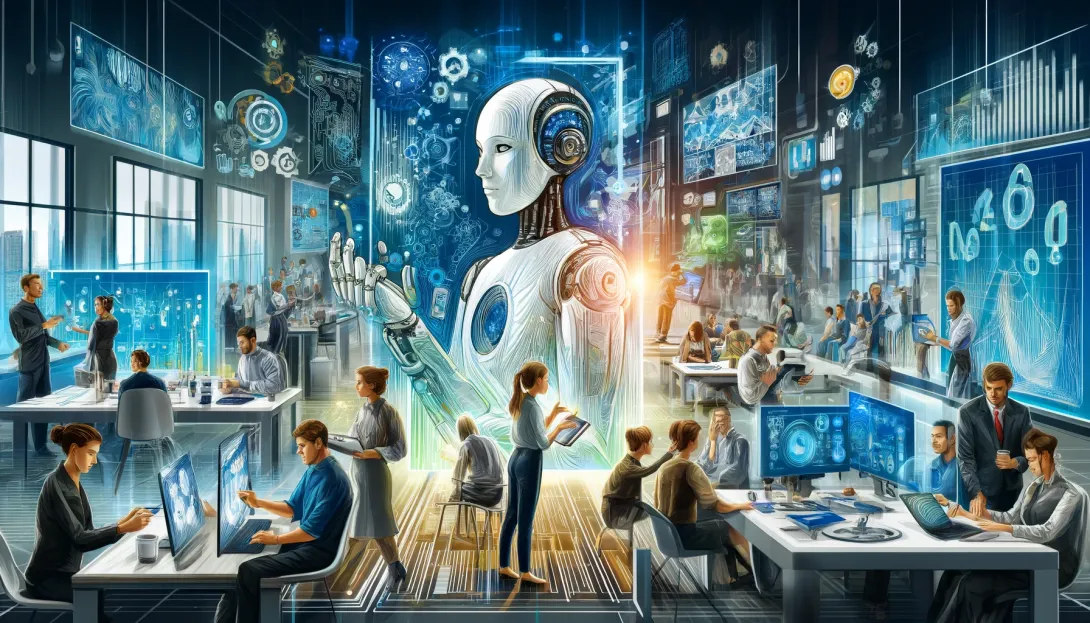
In today’s fast-paced digital world, businesses must continually innovate to stay competitive. One of the most transformative technologies driving this innovation is artificial intelligence (AI). From streamlining operations to enhancing decision-making, AI is revolutionizing how businesses operate. Here’s a closer look at how AI is transforming business operations across various industries.
Streamlining Operations
One of the most significant impacts of AI is its ability to automate repetitive and time-consuming tasks. By automating routine processes, businesses can increase efficiency, reduce errors, and free up employees to focus on more strategic activities.
- Automated Workflow Management: AI-driven tools can manage and optimize workflows, ensuring that tasks are completed in the most efficient order. This reduces bottlenecks and enhances productivity.
- Robotic Process Automation (RPA): RPA uses AI to automate rule-based tasks such as data entry, invoice processing, and customer service inquiries. This not only speeds up these processes but also minimizes human error.
- Supply Chain Optimization: AI can predict demand, optimize inventory levels, and streamline logistics, ensuring that products are delivered on time and at the lowest cost.
Enhancing Decision-Making
AI enables businesses to make better decisions by providing data-driven insights and predictive analytics. With AI, companies can analyze vast amounts of data quickly and accurately, uncovering patterns and trends that inform strategic decisions.
- Predictive Analytics: By analyzing historical data, AI can predict future trends, helping businesses anticipate market changes and customer needs. This allows for proactive decision-making and better strategic planning.
- Real-Time Data Analysis: AI-powered tools can analyze data in real time, providing businesses with up-to-date information to make informed decisions quickly. This is particularly valuable in fast-moving industries where timely decisions are critical.
- Enhanced Forecasting: AI improves the accuracy of financial forecasts, sales predictions, and inventory management, enabling businesses to plan more effectively and allocate resources efficiently.
Personalizing Customer Experiences
In the age of the customer, personalized experiences are key to building loyalty and driving sales. AI enables businesses to deliver tailored experiences that meet individual customer needs and preferences.
- Customer Insights: AI analyzes customer data to provide insights into behavior, preferences, and buying patterns. This helps businesses understand their customers better and tailor their offerings accordingly.
- Personalized Marketing: AI-powered marketing tools can create personalized content and targeted campaigns based on customer data. This increases engagement and conversion rates by delivering relevant messages to the right audience at the right time.
- Improved Customer Service: AI-driven chatbots and virtual assistants provide instant, personalized responses to customer inquiries, enhancing the customer experience and freeing up human agents to handle more complex issues.
Driving Innovation
AI is not just about improving existing processes; it’s also a powerful driver of innovation. By leveraging AI, businesses can develop new products, services, and business models that differentiate them from the competition.
- Product Development: AI can analyze market trends and customer feedback to identify gaps and opportunities for new products. This speeds up the product development cycle and ensures that new offerings meet customer needs.
- Innovative Business Models: AI enables the creation of new business models, such as subscription services and on-demand platforms, that provide more value to customers and generate new revenue streams.
- Research and Development: AI accelerates research and development by automating complex tasks and providing insights that guide innovation. This leads to faster breakthroughs and a shorter time-to-market for new solutions.
Enhancing Operational Efficiency
AI enhances operational efficiency by optimizing resource allocation, reducing waste, and improving quality control.
- Resource Optimization: AI analyzes resource usage to identify inefficiencies and recommend improvements. This ensures that resources are used effectively and reduces operational costs.
- Quality Control: AI-powered quality control systems can detect defects and anomalies in real time, ensuring that products meet high standards of quality and reducing the risk of recalls.
- Energy Management: AI can optimize energy usage in manufacturing and other operations, reducing costs and supporting sustainability initiatives.
Conclusion
AI is transforming business operations in profound ways, driving efficiency, enhancing decision-making, personalizing customer experiences, and fostering innovation. By embracing AI, businesses can stay competitive, adapt to changing market conditions, and achieve sustainable growth.
At Texas Integrated Services, we specialize in helping businesses harness the power of AI to transform their operations. Whether you’re looking to automate processes, gain deeper insights, or develop innovative solutions, our expert team is here to help. Contact us today to learn more about our AI solutions and discover how we can help you stay ahead of the curve.
Contact Information:
- Phone Number: 832-338-2926
Subscribe to Our Newsletter: Stay updated with the latest AI trends and innovations by subscribing to our newsletter.
At Texas Integrated Services, we’re not just service providers; we’re your partners in innovation and growth. Let us help you navigate the future with confidence and success.
Copyright © 2024. All rights reserved.